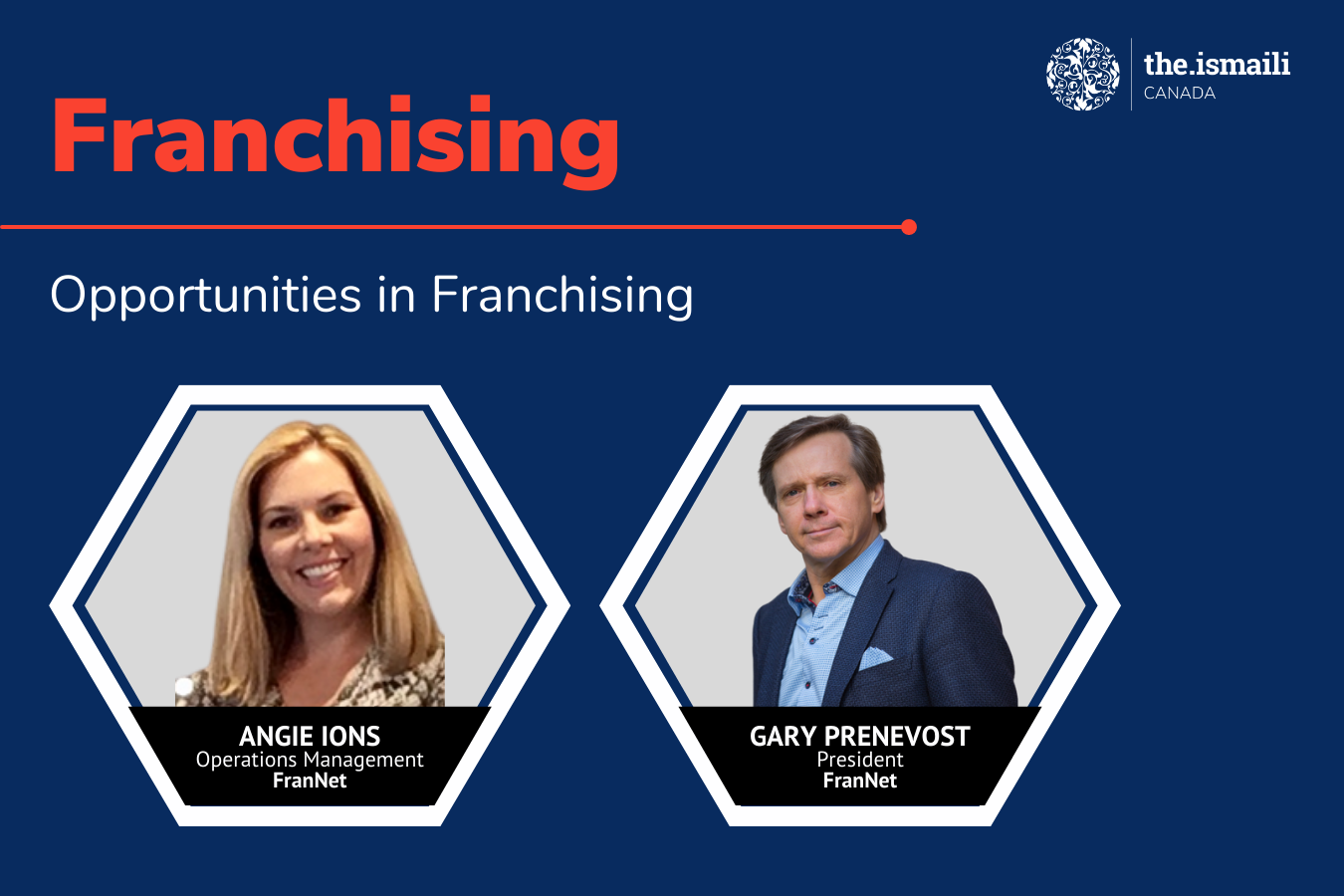
Franchises
The Aga Khan Economic Planning Board is pleased to provide general information on franchising and the essential steps needed to make an informed decision on how to purchase a franchise or turn your existing business into a franchise model.
Additionally, the Ismaili Business Support Network - Referral Program (IBSN), aims to assist Ismaili Business Owners with short-term challenges, recover from the COVID crisis, and position themselves to prosper! IBSN’s referral network of Ismaili professionals is able to provide relevant 1:1 guidance in various business areas free of charge for a minimum of 30 minutes lasting up to a maximum of 60 minutes for each business area query. Click here to ask your question or request support from an expert!
Franchising has become a popular type of business model due to the unlimited range of opportunities in products and services as well as the flexibility in how much capital to invest. A franchise can be purchased for as little as a few thousand dollars. There are over 1.8 million Canadians directly or indirectly employed within the franchise industry. Well over 1,300 franchise concepts are operating within Canada with more than 76,000 locations across the country.
Opening a business generally involves a large commitment of capital and requires a product or service to sell. This makes the opportunity to start a business much more difficult and risky. Franchising, however, is a pathway to start a small business with an established brand or service with potentially lower capital commitment, making small business ownership relatively less risky.
Franchising works best for those who:
- Need an idea for a product or service to sell
- Want to reduce the risks associated with opening a new business by taking advantage of a proven business model
- Require support and resources when opening their new business venture due to their lack of business knowledge
Buying an established franchise business model may allow you to REDUCE AND PERHAPS avoid many common start-up challenges typically faced by a new business owner. In franchising, the franchise owner, known as the franchisor, has already established a successful operation through trial and error. When you are buying a franchise, you are normally buying into a brand with a proven track record of success. Buying into a franchise is not, however, a guarantee that your small business will succeed. It is important to take the time to perform ‘due diligence’ by speaking to existing franchise owners, developing a realistic expectation of revenue and expenses as well as comparing different types of franchise concepts. Become familiar with the concept of franchising as well as the product and service that you will be selling while seeking counsel from advisors and industry experts.
Please note, that the information on this page is meant to serve as a starting point for those considering purchasing a franchise, or starting one. The information on this page and its contents are intended for general informational purposes only and are not intended to be professional advice nor the advice of the Shia Imami Ismaili Council for Canada or its boards, portfolios, or local councils, including the Aga Khan Economic Planning Board for Canada. Please seek the advice of a relevant professional advisor in relation to your specific situation.
In franchising, there are two important parties involved, the franchisor and the franchisee. A franchisor owns the business brand name and the concept, allowing the franchisee the use of the trademark, brand and business operation model. In exchange for access to this private information and intellectual property, the franchisee generally pays a start-up fee plus an ongoing percentage of gross revenue called a royalty or an established payment to the franchisor and agrees to operate the business in accordance with the terms and conditions specified in the franchise agreement. A legal and commercial relationship is required to formalize the business arrangement, which should be reviewed comprehensively with your lawyer and accountant.
The type of business and the size can vary considerably, allowing you to choose the franchise concept that best fits your budget, skills and long-term goals. A franchise operation may include offering a product, service, or a combination of both.
The franchisor, in most cases, exercises strict control over operational processes, marketing and the product or service sold. The franchisee controls the day-to-day management of the business such as hiring, scheduling, and following local employment standards. The success of the business is always in the best interest of both parties and for this reason, the franchisor may provide guidance and support on best practices for hiring, training, scheduling and wages.
The franchisor wants to successfully expand its profitable business locations by supporting its franchisees whose goal is to manage the daily operations to the terms of the franchise agreement with the intent to be profitable. The relationship between both the franchisor and the franchisee is the most important aspect of ensuring a successful partnership.
Most often, you, as the franchisee, will also receive the benefits of resources and support such as advertising, training, and access to supplier discounts. In turn, you will be part of a large network of similar franchisees, gaining benefit from economies of scale. These resources are generally not available to individuals starting their own small business.
A franchise offers a turn-key business model which provides access to many resources such as:
- Standardized operations and access to product or service vendor discounts
- Established branding for your business
- Support in sales development, marketing, operations, technology and staff training
- Ongoing improvement of products and services to ensure that the business model stays competitive to the marketplace
It is important to understand the terms and conditions of the agreement as it specifies how the business is operated, what products and services can be supplied, hours of operation, where supplies are purchased and day-to-day standards to be followed by the business. While the franchisee may own the small business, there are operating and marketing policies that must be adhered to remain a franchise unit. This restriction protects other franchisees who own similar businesses and ensures consistency from one location to another.
You should seek guidance from legal counsel and experts familiar with this area.
Franchising may offer many benefits to those wanting to open a small business, but the concept is not suitable for everyone. It is important to understand the characteristics of franchising including potential constraints and restrictions posed upon the small business owner.
Carefully consider the following:
Franchise businesses require just as much time commitment as a regular small business. While some franchises lend themselves to absentee ownership, most are run by hands-on management. You must be willing to invest and commit time to the business. Small business ownership generally involves taking on all tasks and duties, including front-line operations, cleaning, and sales. Get comfortable with a variety of duties and tasks, some of which you may not have imagined as part of owning a business.
Look for a franchise that focuses on your interests and skills as you will be expected to be the ambassador of the brand at your location at all times. If you enjoy working with animals, then a pet franchise concept may be your best option. Many types of franchises are available with varying products and services. Choose the one you feel will provide you with passion for many years to come while complimenting your skill set.
Ask yourself, how will I respond to coaching and advice on running my business? In franchising, you will be expected to follow operational processes and policies while adhering to a specific set of guidelines for how your business looks and operates. In most cases, personalizing your business location to suit your taste is restricted. If you are uncomfortable with following standards posed upon you by the franchisor, a franchise business will not be the best option for you.
Are you financially vested in your business? Operating a franchise involves more than the franchise fees. Individuals who want to purchase a franchise must also be prepared for operating costs, equipment, payroll, rents, and utilities. Having sufficient savings to meet cash flow requirements is critical to ensuring smooth operations.
Does the concept of a franchise fit your current lifestyle? You may be required to work on weekends or late-night hours. In most instances, new franchise businesses require a commitment to long working hours until the business has established itself and is properly staffed.
Take the time to do a self-assessment to understand whether franchising is right for you. Please click here to view a video that explains the important steps to undertake before purchasing a franchise.
Franchising comes with many benefits for individuals who are looking to open a small business. The most important benefits that come with purchasing a franchise business include:
Brand recognition from customers who recognize your product or service
Support and resource tools such as training, marketing, and access to a network of similar franchisees who may have collective buying power for supplies and services
Access to knowledge and experience from the franchisor who will want to support your business so that it may succeed
Faster start-up of a brand-new business location, as most franchisors have an established network of contractors and building plans
Generally, franchises offer greater investment security than a brand-new small business as you have the support and backing of a larger established brand. However, there are some drawbacks that a potential franchise owner must be aware of. These include:
Royalty payments and marketing fees that are normally paid to the franchisor in various forms, such as a percentage of sales or a lump sum payment
Restrictions on where you can operate, the products or services that can be sold, and the suppliers that you can use
Having to provide your franchisor full transparency on your business’s financial standing
Reliance of a potentially negative brand reputation which can directly impact your success without any fault of your own
Franchise opportunities can vary in size, complexity and the types of products and services being offered. It is important to find a franchise concept that works best for your skills, geographic location, and budget to have a foundation for a successful small business.
Below are external links to comprehensive databases of franchise opportunities. The links will provide you with many opportunities across Canada that are currently available. It is also important for you to complete your own due diligence by evaluating the prospective business and its finances, legal agreements and operational processes.
Important questions to ask a prospective franchise business owner or its representative include (but not limited to):
- What resources and support tools are available when purchasing a franchise?
- Does the franchise have a local field support person that you can contact?
- Does the franchise provide assistance in obtaining financing and finding a location?
- How much do you need to invest and what is the breakdown of fees and royalty payments?
- How is training provided and is there a cost?
- Can you talk to other franchise owners about their experience?
The external links below provide a wide range of potential franchise opportunities in various industries:
The Canadian Franchise Association Directory of Opportunities
Canada Franchise Opportunities
Please note that the Institutions do not endorse these opportunities, and you should complete your own due diligence by evaluating the prospective business and its finances, legal agreements and operational processes, and seek advice from experts as necessary.
Shown below are widely used franchising terms that a franchise investor should be familiar with:
- Advertising Fund: A pool of funds, normally calculated as a percentage of gross revenue which franchisees pay into. The advertising fund is used by the franchisor to market the brand.
- Area Franchise: Rights given to a franchisee to open franchise units within a defined territory.
- Conversion Franchising: A type of business franchising in which an existing independent business is converted into a franchise allowing an independent business to use the franchise brand name, trademark and operating system.
- Disclosure Document: A document that provides details on the franchisor and the terms of the franchise agreement.
- Franchise Fee: normally a one-time fee, paid by the franchisee to the franchisor for the right to use the brand name and receive services from the franchisor.
- Initial Investment: the estimated total investment a franchisee will require to get a franchise unit operational. Some of the costs included in the initial investment include the franchise fee, equipment and build-out costs, property lease and upfront business start-up costs.
- Royalty Fee: An ongoing fee paid by the franchisee to the franchisor. The royalty fee is usually a percentage of gross revenue but may also be a flat fee.
- Single Unit Franchise: A single franchise business unit, as opposed to a multi-unit ownership in which more than one franchise unit is owned.
- Turnkey Franchise: A franchise business unit in which the franchisor finds the location, builds out the unit, leases the property and thereafter transfers the business unit franchise to a franchisee.
- Territory: A designated area normally sold with a franchise in which a franchisee is authorized to establish and operate a franchise.
- Transfer: Ownership of a franchise business being moved from one party to another.
Looking for additional information on franchising opportunities? There are many external associations and groups that provide in-depth information sessions, trade-fairs, seminars, and workshops on franchising. Below are links to two external sources:
- The Canadian Franchise Association provides sessions on franchising here.
- Details for trade shows on franchising in Canada is available here.
It is highly recommended that you also visit the website of a specific franchise you may be interested in to see if they may offer workshops on their franchising opportunities.
Additional franchise publications and resources are also available externally through the following links:
Please note that some external content may have services that require payment.
Existing franchise owners require many resources to help them succeed. A franchise owner can access tools and resources to help navigate through the various stages of operating a franchise, including information on how to take your business online through digital transformation as well as access to membership in organizations with a wide selection of on-demand resources.
Whether you are looking for specific information or want to connect with others in your franchise field, you will find that the available resources provide you with the support and confidence to continue managing your existing franchise operation.
Your first step should be to visit your franchisors’ website as in most cases, specific information and assistance on your franchise may be available directly from your franchisor.
The Business Services page also provides many resources and services for business owners to leverage related to distress, COVID support programs, and more.
If your franchise is store-front, it may be a good idea to market your business online to increase your business’ visibility. Before doing so, ensure that your franchise agreement allows you to create a digital marketplace and that you are following established policy requirements. In many cases, your franchisor may have specific guidelines on digital marketing and may provide you with resources for your franchise product or service.
After reviewing your franchise agreement, if you need assistance with digitally transforming your business online, visit the Digital Transformation resource page.
The Canadian Franchise Association provides resources on
- Programs and services specifically for franchise owners
- Access to news and economic reports specific to franchises in Canada
- Tools and resources for labour and safety compliance and regulations
- Access to on-demand webinars on various topics that directly affect franchise owners
- Knowledge and shared resources from other franchise owners
If you are an existing franchise owner, your franchisor may already be a member of the Canadian Franchise Association. Franchisors can obtain membership by confirming that your franchisor is an existing member. Please click here to find out.
For information on how to become a member, please complete this short form.
The Canadian Franchise Association is an external organization and may charge for some of their services.
Your small business franchise can leverage an extensive network of organizations that can provide services and tools to assist you with growing your business and discussing specific needs. Links are provided below to some common external organizations.
- The Retail Council of Canada is a trade association offering various resources to small retail business owners
The Funding Portal provides information and services related to government funding and grants for small and medium businesses
The Canadian Federation of Independent Business offers information and support for independent business owners
The Centre for Women in Business provides resources and support to women who own, or are considering opening a small business
Business Development Bank of Canada offers a range of financial, management and consulting services to assist small and medium-sized businesses
Please note that some resources may require fees for their services.
For insights on why franchising may be the right option for: individuals looking for entrepreneurial options, existing business owners wanting to expand, and successful businesses owners who may want to move to a franchise model, the webinar below shares information on how the franchising model works, the risks and rewards, as well as the criteria needed to successfully choose the right franchise.
Owning or purchasing a franchise can be very complex and time-consuming. A franchise consultant can provide assistance to you in evaluating your options on specific business matters. Normally, a franchise consultant charges a fee for their services.
There are many different firms in Canada that provide franchise consulting services. Depending on the complexity of your needs, look for a consultant that can provide financial, recruitment, legal and contract services, as well as any specific assistance you may need.
Most consultants will also provide you with in-house research and information on the specific type of franchise business that you are interested in. As an advisor, the franchise consultant is someone who looks out for your best interest and thus should be asking you information on your budget, your short and long-term goals as well as your work history and any skills that you may have.
Talk to more than one franchise consultant if you are interested in obtaining help with your franchise purchase or looking for advice on an existing business.
For a small business owner who has a successful business operation and is looking to expand, developing a franchise may be the next step to growth.
Does your business fit a franchise model? Think about the following key requirements:
- The business must have shown a history of sustained financial performance and success. This includes earning enough money to cover your fees and royalty payments.
The operations, marketing and sales process can be standardized and easily taught to potential franchisees and their employees.
There must be a strong and compelling reason for an investor to buy into your business model as opposed to starting a similar business from the ground up.
The business must be scalable and have the ability to be successful in other locations or regions.
While your business model may meet the criteria to be a franchise, you should also be prepared to move from running the day to day operations of a business to managing and coaching a group of franchisees. You will need to invest capital into developing a franchise operation. Typical costs include legal fees, trademarking and protecting your brand, developing operational policies, marketing and advertising. You will also need to develop and offer standardized training programs and other support tools to ensure the success of your franchise business.
The Canadian Franchise Association may be able to provide you with additional resources and tools through seminars, consultation and professional support. You can access more information here.
It is recommended that you get professional advice from your financial institution, accountant and lawyer before you enter into any agreements. The Business Development Bank of Canada (BDC) also provides resources to businesses looking to expand into franchising, which can be accessed here.







